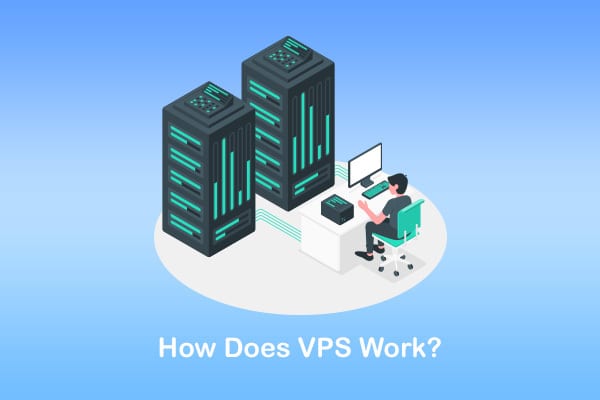VPS Hosting is a type of web hosting that uses virtual private servers to host websites. It provides more control and flexibility than shared hosting, as each website has its own virtual server with dedicated resources such as RAM, CPU and disk space. VPS Hosting works by dividing one physical server into multiple isolated environments called “virtual servers”.
Each environment functions just like an independent machine, allowing users to install applications and configure settings without affecting the other virtual servers on the same physical hardware. The owner of the VPS can also manage their own security settings, operating system updates and software installations. In addition, they have full root access to customize the environment in any way necessary for their project or website needs.
VPS Hosting is a type of web hosting that provides users with more control over their server and allows them to customize the environment according to their needs. It works by using virtualization technology, which creates multiple isolated servers within one physical server, each with its own operating system and resources. This makes it possible for businesses to access better performance without having to invest in dedicated hardware or manage complex configurations.
VPS Hosting offers improved reliability, flexibility, scalability and security compared to shared hosting solutions.

Credit: www.dreamhost.com
What is Vps Hosting Used For?
VPS hosting is a type of web hosting that allows users to have their own virtual private server (VPS). This means that instead of having to share resources with many other websites, you get your own portioned off space on the same physical server as others. With VPS hosting, you’re able to customize and configure your environment according to your specific needs.
This makes it ideal for businesses or individuals who need more control over their website than what is provided by shared hosting plans. When using VPS hosting, you gain access to features such as root access and dedicated IPs without having to pay extra fees. Additionally, most VPS providers offer additional services such as managed backups, SSD storage options and firewall protection which can help protect your data from malicious attacks.
In addition to this, some VPS providers also offer various development tools like multiple versions of PHP/MySQL so that you may quickly deploy applications or scripts in a secure environment. Overall, VPS Hosting provides an affordable solution for those looking for greater control over their website’s performance and security while still being cost-effective compared with other types of web hosting solutions available today.
Do I Really Need Vps Hosting?
If you are looking for a reliable and powerful hosting solution, then VPS hosting may be the right choice for you. VPS stands for Virtual Private Server and is an intermediate type of web hosting that sits between shared hosting and dedicated server solutions. It gives website owners the advantage of having their own virtual server with root access to manage their websites better while still keeping costs low.
With VPS, customers get complete control over their environment so they can install any software or applications they need without worrying about compatibility issues or other restrictions imposed by shared servers. Additionally, as your traffic grows, you can easily upgrade to higher plans with additional resources like RAM and storage space. Ultimately, choosing whether or not you need VPS hosting depends on your specific requirements; however if you want more flexibility in terms of managing your website such as being able to customize the applications running on it or have full control over security settings then investing in a VPS is definitely worth considering.
When Should I Use Vps Hosting?
You should use VPS hosting when you need more control and flexibility over your web hosting environment than what is available with shared hosting. With a Virtual Private Server (VPS), you can create an independent virtual server that has its own resources, such as memory, storage and processing power. This allows the user to have full root access to their server which gives them the ability to install any software they require without being limited by shared resources.
Additionally, because a VPS acts like its own mini-server in terms of resource allocation, it also offers greater stability and security compared with shared hosting environments since each account runs independently from one another on the same machine. Furthermore, if additional RAM or CPU cores are required for increased performance then this can easily be achieved without having to upgrade hardware or move websites around multiple servers. All of these features make VPS hosting attractive for businesses who want more control over their online presence but don’t necessarily need dedicated servers yet.
What is Difference between Normal Hosting And Vps Hosting?
VPS, or virtual private server, hosting is a type of web hosting that uses software to divide a single physical server into multiple separate virtual servers. Each VPS operates as an independent “virtual machine” and can be configured with its own operating system, memory limits and disk space. In contrast to normal shared hosting plans where one server hosts multiple websites at once, VPS hosting allows each website to be hosted in isolation from the others on the same server.
The main benefit of utilizing VPS hosting over traditional shared web hosting is increased performance. Because there are fewer websites running on each individual machine, your website will have access to more resources than if it were sharing a single physical server with other sites. This means faster loading speeds for visitors and better scalability when dealing with sudden traffic spikes or unexpected growth.
Additionally, since each site runs independently of the others on the same server it also offers improved security over traditional shared plans which could potentially put your data at risk if another user’s website was hacked or affected by malicious software.
What is a VPS or Virtual Private Server?
What is Vps Used for
A VPS (Virtual Private Server) is a type of web hosting solution that provides users with their own dedicated server environment to access and manage. It’s ideal for businesses or individuals who need more control over their server resources than what shared hosting can provide. With a VPS, customers have the ability to host websites and applications, install custom software, update system software, and much more.
Additionally, since each customer has its own virtual server environment, it offers enhanced security measures compared to shared hosting plans.
Vps Vs Vpn
When it comes to online security and privacy, there are two main options: Virtual Private Server (VPS) or Virtual Private Network (VPN). VPS is a dedicated server that creates an isolated virtual environment for hosting websites and applications. VPN, on the other hand, is a type of network that creates an encrypted connection between your computer/device and another network over the internet.
Both provide an added layer of security to protect your data from malicious third parties but have their own unique features and benefits. VPS offers more control over resources such as memory, storage space and access to specific software programs while VPN provides anonymity by hiding your IP address from prying eyes. Ultimately, choosing which one best suits your needs depends on the level of security you’re looking for along with budget considerations.
Vps Vs Dedicated Server
When it comes to web hosting, VPS (Virtual Private Server) and Dedicated Server are two popular options. A VPS is a virtual machine where you have access to full root control over the server’s operating system, software, and hardware configuration. This allows you to customize your hosting setup according to your needs while keeping costs low.
On the other hand, a dedicated server gives you physical access and complete control over your hardware resources with no limitations on customization or scalability. The major difference between these two types of servers is that a VPS offers shared resources whereas a dedicated server provides exclusive use of all its resources – meaning that there won’t be any competition for CPU cycles or RAM usage from other users on the same server as yourself.
Vps Vs Shared Hosting
When it comes to hosting your website, there are two main options available: VPS and Shared Hosting. While both have their own advantages and disadvantages, the primary difference between them is that VPS allows for more flexibility and control over your server environment as compared to Shared Hosting. With VPS you get a dedicated virtual machine with root access which provides more customization of software installations, increased security, better performance and more reliability than shared hosting.
On the other hand, shared hosting offers lower cost with less control on configuration but can be ideal for smaller websites that don’t require much customization or resources.
Free Vps
A VPS (Virtual Private Server) is a great way to access secure, reliable hosting solutions without having to pay for a dedicated server. With a VPS, you get the same benefits as with dedicated hosting but at a much lower cost. A free VPS also allows users to have full control over their hosting environment and make changes on-the-fly without having to contact or wait for technical support from the host provider.
This makes it an attractive option for those who need more flexibility in their web hosting experience.
Vps Stand for
VPS stands for Virtual Private Server, and it is a type of hosting that allows users to have their own isolated environment within a server. It provides the user with root access, meaning they can customize their setup however they want while also having more control over security settings and performance. VPSs are usually used by businesses as an affordable alternative to dedicated servers or cloud-based hosting solutions.
Vps Vs Gps
Virtual Private Servers (VPS) and Global Positioning System (GPS) are two completely different services. VPS provides access to a virtual machine which can be used for hosting websites, applications or other software services. On the other hand, GPS is a satellite-based navigation system that allows users to accurately pinpoint their location on earth.
While VPS is an essential tool for businesses and webmasters, GPS technology has become indispensable in our day-to-day lives as it enables us to map out routes and find locations quickly from virtually any device with internet access.
What is Vps Forex
VPS Forex is a virtual private server (VPS) that allows you to trade the foreign exchange market with greater speed, efficiency, and reliability. It provides access to high-speed servers located in various locations around the world, allowing traders to execute trades faster than ever before. VPS Forex also offers features such as automated trading systems and scalability for larger accounts.
With its increased accuracy and reliability compared to traditional methods of trading forex, VPS Forex has become an increasingly popular choice among experienced traders.
Conclusion
VPS hosting is a great option for businesses that need more control and flexibility than shared hosting, but don’t have the resources to handle their own dedicated server. By using virtual private servers, companies can ensure their website remains secure while having access to specific services tailored to their business needs. VPS hosting offers many advantages over traditional web hosting solutions including better resource allocation and improved scalability.
With its ability to provide reliable performance and cost-effective pricing options, VPS hosting is an attractive choice for many businesses looking for a dependable solution.



